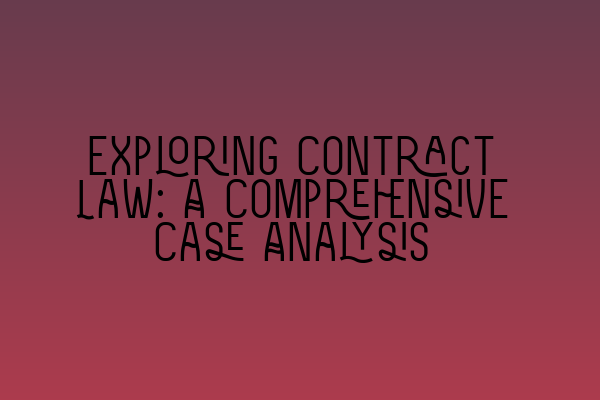Exploring Contract Law: A Comprehensive Case Analysis
Welcome to our in-depth exploration of contract law. In this article, we will delve into the intricacies of contract formation, terms, breach, and remedies. Whether you are a student preparing for the SQE contract law exam or a legal professional seeking a refresher, this comprehensive case analysis will provide you with the knowledge you need to excel in understanding and applying contract law.
Before we dive into the intricate details, it’s important to have a solid understanding of the fundamentals. A contract is a legally binding agreement between two or more parties that creates an obligation to perform specific actions. It is essential to recognize that not all agreements are contracts. For an agreement to be legally enforceable, certain elements must be present.
Contract Formation
The first and foremost requirement for a valid contract is an offer. An offer is a clear and definite statement indicating a willingness to enter into a contract. It must be communicated to the offeree and contain essential terms, such as the subject matter, price, and time for performance. In SQE 1 Practice Mocks FLK1 FLK2, you can find practice questions to test your understanding of offer formation.
Once an offer is made, the second requirement is acceptance. Acceptance occurs when the offeree agrees to the terms of the offer, without any conditions or modifications. It is crucial to note that acceptance must be communicated to the offeror for a contract to be formed. Failure to communicate acceptance may result in a mere counter-offer. To deepen your knowledge of acceptance, explore our SQE 1 Practice Exam Questions.
Terms of the Contract
Once a contract is formed, it is essential to identify and understand its terms. A term is a promise or an undertaking that forms part of the contract. Terms may be express, which are explicitly stated by the parties, or implied, which are inferred by law or custom. Implied terms play a significant role in contract law, as they fill gaps and provide necessary protections. It is crucial to have a solid grasp of express and implied terms, as they can greatly impact contract interpretation and enforceability.
In some cases, a term may be considered a condition, which is a vital part of the contract. Breach of a condition gives the injured party significant rights, including the right to terminate the contract and claim damages. On the other hand, a term may be considered a warranty, which is a less essential part of the contract. Breach of a warranty entitles the injured party to claim damages but does not give them the right to terminate the contract. Understanding the distinction between conditions and warranties is crucial in assessing the consequences of a contract breach.
Breach and Remedies
When one party fails to fulfill their contractual obligations, a breach occurs. There are several types of breaches, including a material breach, anticipatory breach, and partial breach. A material breach is a substantial failure to perform a significant part of the contract, while an anticipatory breach occurs when one party declares their intention not to perform before the agreed-upon time for performance. A partial breach, also known as a minor breach, refers to a failure to perform a minor part of the contract.
In the event of a breach, various remedies are available to the injured party. The most common remedies are damages, specific performance, and cancellation or rescission. Damages typically aim to compensate the injured party for losses suffered as a result of the breach. Specific performance is a remedy sought when monetary compensation cannot adequately remedy the breach. It involves requesting the court to order the breaching party to fulfill their obligations as specified in the contract. Cancellation or rescission, on the other hand, allows the injured party to terminate the contract and seek restitution.
Conclusion
Contract law is a complex and fascinating area of legal study. Understanding the intricacies of contract formation, terms, breach, and remedies is essential for any aspiring lawyer or legal professional. We hope this comprehensive case analysis has provided you with valuable insights and a deeper understanding of contract law. To further enhance your knowledge, consider enrolling in our expert-led SQE 2 Preparation Courses or SQE 1 Preparation Courses.
Stay updated with the latest SRA SQE Exam Dates as you embark on your journey to become a legal professional proficient in contract law. Happy exploring!
